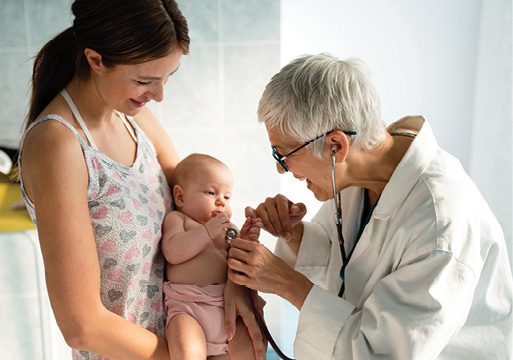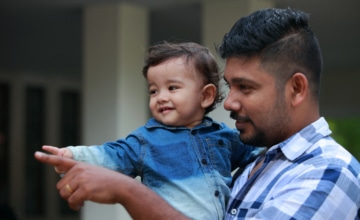ZERO TO THREE Policy Center, Washington, DC
Editor’s Note
To understand the broader societal context for supporting the healthy development and well-being of infants and toddlers, the following excerpt from the State of Babies Yearbook: 2022 Executive Summary presents key findings on the status of America’s families with young children. As of August 2022, the reconciliation bill proposed in the Senate does not include the durable, sustained investments in health, tax credits, or child care policies recommended in the 2022 Yearbook that would directly support families with young children. The authors remain hopeful the opportunity to implement these and other transformational supports for babies and families will not be missed in the final legislation. Visit the State of Babies (stateofbabies.org) website for more detailed information, resources, and tools to support advocacy efforts and learn how to take action to ensure that families receive the supports they need for children to thrive.
Grounded in the science of early childhood development, ZERO TO THREE’s policy framework promotes support for infants and toddlers’ healthy development in three domains: Good Health, Strong Families, and Positive Early Learning Experiences. The State of Babies Yearbook: 2022 uses this framework to provide national and state-by-state views of how America’s babies and their families are faring, based on more than 60 indicators of what all babies need to thrive. This Yearbook edition also presents a view of how babies and families in Puerto Rico are faring, wherever the data are available.
Good Health
Although there has been minimal progress or an absence of change at national and state levels on most health indicators, the evidence of gross disparities persists beneath the averages—particularly for American Indian/Alaska Native and Black babies—in maternal health and birth outcomes such as receipt of prenatal care, infant mortality, low birthweight, and prematurity (see Figure 1). Most alarming, 2022 Yearbook data show a marked increase in the nation’s maternal mortality rate. The persistence of these findings from past editions underscores the need for a robust response in national and state policies.
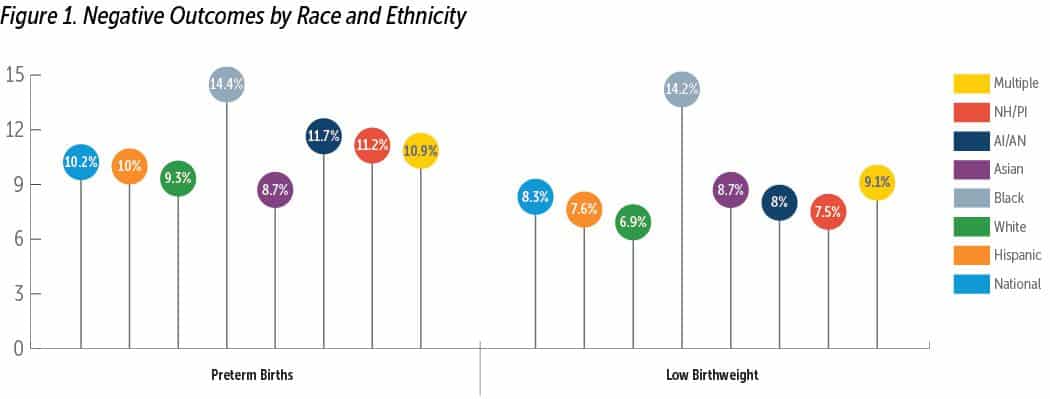
The incidence of babies missing important preventive care visits mid-pandemic declined to a small degree in 2021. However, decreased access to preventive health care continued to be a key concern, particularly among American Indian/Alaska Native, Black, and Latinx babies and babies in families with low income. Increased and interrelated levels of emotional distress among parents and children also remained a concern (Center for Translational Neuroscience, 2021). Strong national policies should center on expanding health insurance coverage, embedding child development and family support in primary pediatric care, and building capacity in infant and early childhood mental health.
Strong Families
Although the Yearbook’s pre-pandemic findings for family resilience in the face of challenges continue to be positive and are virtually unchanged from previous editions, findings related to basic needs indicate an increase in families experiencing material hardship—particularly food insecurity. At the same time, a decline was seen in families in poverty receiving assistance through Temporary Assistance for Needy Families benefits. These and other indicators of family well-being show that families with low income struggle with basic needs (e.g., food insecurity, housing, and basic income supports), and their babies are more likely to be exposed to adverse childhood experiences.
RAPID Survey data (Center for Translational Neuroscience, 2021) on the experiences of families during the pandemic in 2021 indicated that while overall fewer families with babies experienced a drop in income as families began to return to work, Black, Latinx, and low-income households continued to experience decreased income at high and virtually unchanged rates from the previous year (see Figures 2 & 3). These indicators of ongoing material hardship continue to contribute to higher levels of emotional distress for parents and their babies.
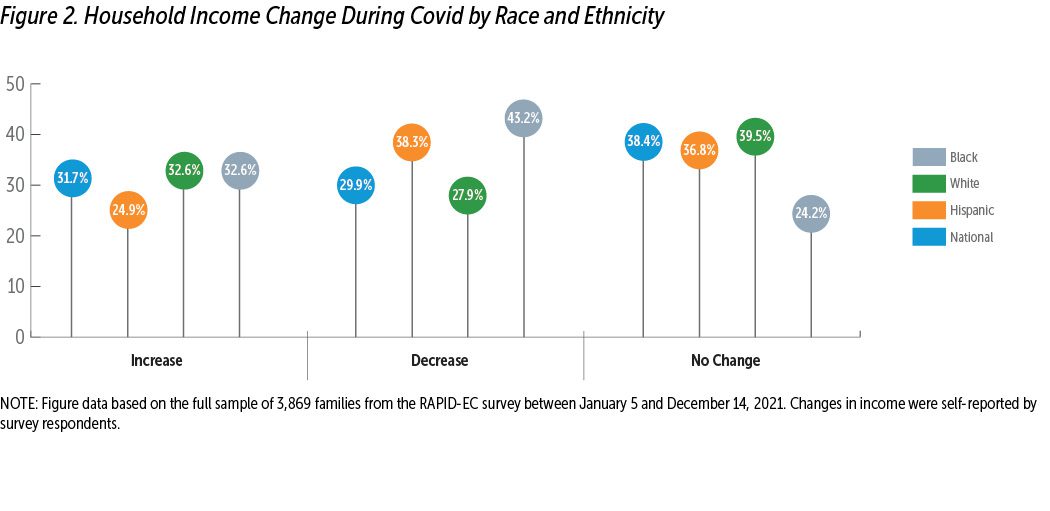
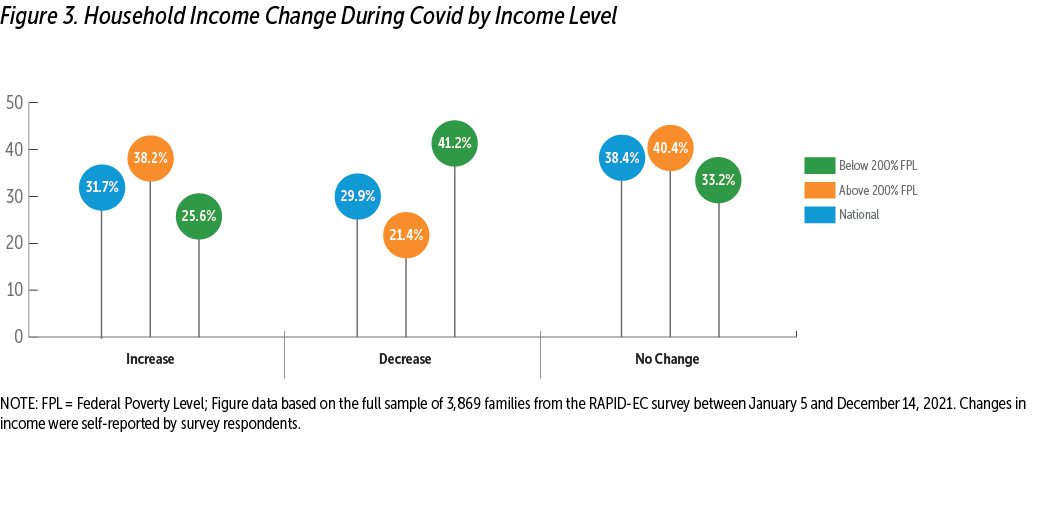
Strong national policies must build on the successes of the American Rescue Plan, such as the enhanced, fully refundable child tax credit, and create permanent measures that promote economic security and ensure families with young children can take paid time off. Supports proposed in the House-passed legislation would have strengthened and brought stability to families in periods of crisis and calm.
Positive Early Learning Experiences
From being read to every day to securing a place in Early Head Start or receiving assistance for quality child care, babies need a greater investment in their foundational development. The pandemic rendered the fragile structure for child care and parental support even more unstable and made access to quality care more challenging for families. Although RAPID Survey findings over the course of 2021 showed that household use of non-parental child care substantially increased overall for the nation’s families, this was not the case for families with low income (see Figure 4). The return to its use remained strikingly lower among families with low income.
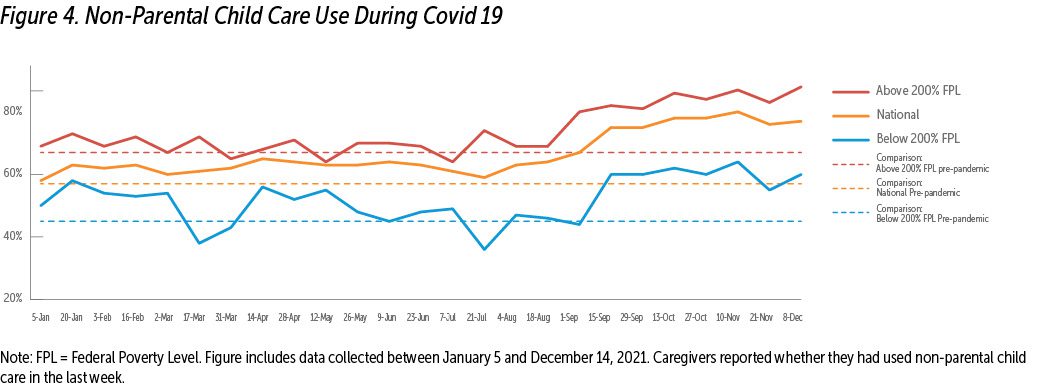
Stabilization funding for child care put in place through the American Rescue Plan provided temporary relief at a robust level, particularly for families with low income, that could lay the foundation for a stronger system. Low wages for child care providers increased their own experiences of material hardship. Job losses, an exodus from the child care workforce, and increased costs of care contributed to reduced availability in 2021 that left parents with fewer options. However, the nation’s child care system remains in crisis without durable policies and investments to build on that foundation.
The United States must turn its sights to building a child care system that is recognized as a vital component of the economic infrastructure and is accessible for all, expanding Early Head Start to provide comprehensive services to all eligible infants and toddlers and more pregnant women, and expanding early intervention services to reach more children to prevent and address developmental delays and disabilities. As a nation, we continue to ignore the need to ensure our babies have quality early learning experiences that nourish their early development.

Findings related to basic needs indicate an increase in families experiencing material hardship—particularly food insecurity.
Ensuring All Babies Have a Strong Foundation to GROW
The state in which a baby is born and lives during their first 3 years can make a difference in whether they have a strong start in life. All states have room to grow in how they support parents in nurturing the development of their young children. Although some states are more advanced than others, subgroup data make clear that even states with the most positive environments for families with young children need to look inward and examine the equity of opportunity for every baby.
The objective for each edition of the Yearbook is to ensure the data provided help policymakers and advocates spur action and track policies over time to support young children and their families. For the 2022 Yearbook, we continued to explore using available data to provide the most comprehensive view of babies and their families, and we have made further enhancements to achieve that goal. Most important, in this fourth year we have acted on our plan to achieve a more stable set of indicators by assessing their performance (individually and collectively) in the past 3 years and refining the state ranking process.
We continue to use a transparent ranking process to group states into one of four tiers to provide a quick snapshot of how they fare on selected indicators and domains. These tiers represent four groupings of states that are approximately equal in size and ordered from the highest to lowest performing. Figure 5 provides the overall rankings of states’ performance for the 2022 Yearbook.
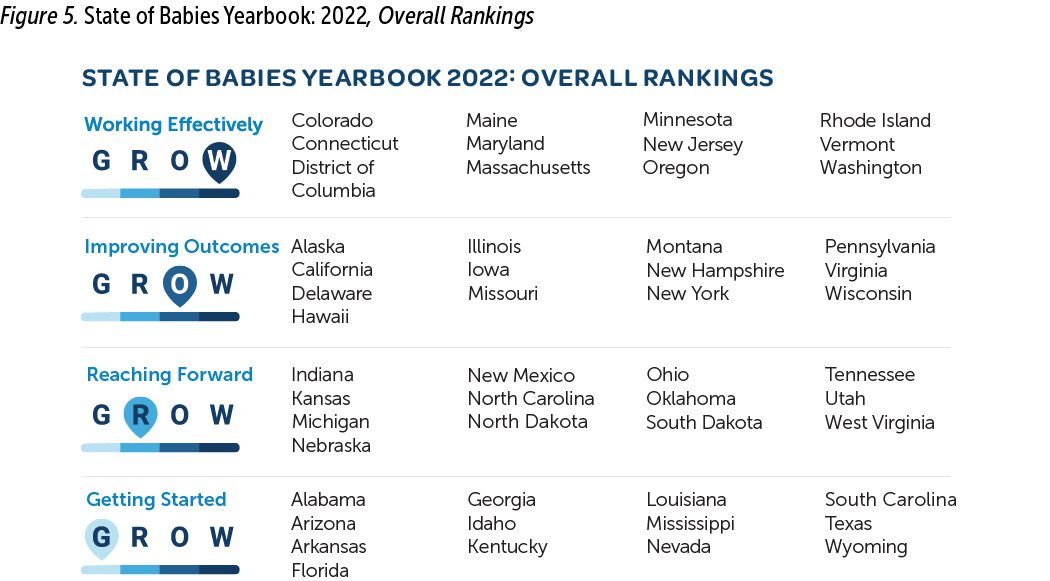
Additional enhancements have been made to the State of Babies website (stateofbabies.org) to expand the information available to visitors to the site and provide a broader context for the data presented there. We hope state policymakers and advocates will use this opportunity to look beyond the averages to really “see” their babies and focus on the children and families behind the numbers using the more extensive data in their profiles available on the website. Specifically, states and communities can look at the subgroup data together to forge a common understanding to start the conversations and actions that can promote equitable access to the ingredients all babies need to thrive.
Acknowledgments
The State of Babies Yearbook: 2022 is part of ZERO TO THREE Policy Center’s Think BabiesTM campaign. ZERO TO THREE created Think Babies to make the potential of every baby a national priority. Learn more at thinkbabies.org.
The data and indicator analysis in the Yearbook are powered by Child Trends, the nation’s leading nonprofit research organization focused exclusively on improving the lives and prospects of children, youth, and their families. For 40 years, decision makers have relied on the organization’s rigorous research, unbiased analyses, and clear communications to improve public policies and interventions that serve children and families.
To provide perspective on the real-time effects of the ongoing pandemic on families with infants and toddlers, the Yearbook is supplemented by national data collected through the University of Oregon’s RAPID Survey Project (now based at Stanford University). Initially launched on April 6, 2020, by the university’s Center for Translational Neuroscience, the findings from the survey shed light on the breadth of the pandemic’s effects on the multiple systems that are central to the livelihood and stability of families with young children.
Suggested Citation
Zero to Three Policy Center (2022). Promoting good health, strong families, and positive early learning experiences: State of Babies Yearbook: 2022. ZERO TO THREE Journal, 43(1), 13–17.
Reference
Center for Translational Neuroscience. (2021). Rapid Assessment of Pandemic Impact on Development Early Childhood Household Survey Project. University of Oregon [data set]. https://static1.squarespace.com/static/5e7cf2f62c45da32f3c6065e/t/6182a1827f87ab67ea7d06fa/1635950978619/emotional-distress-factsheet-nov2021.pdf

